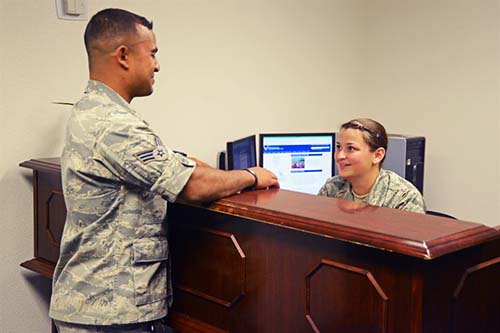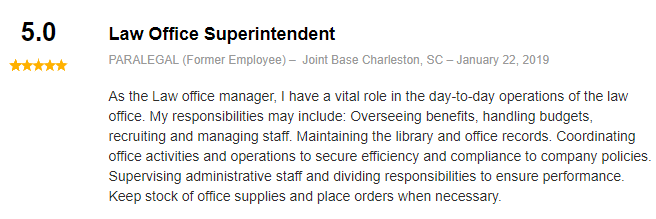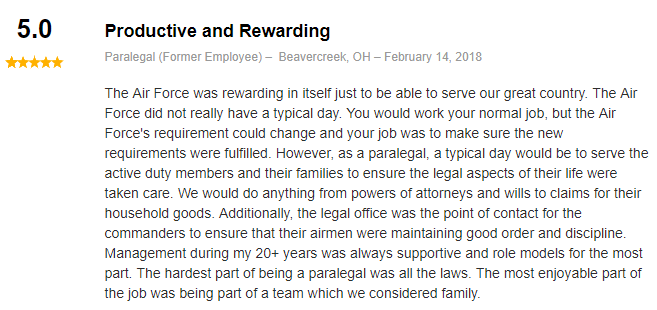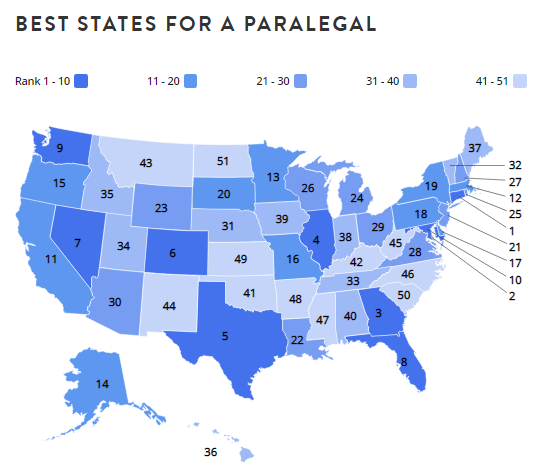Overview
Air Force Paralegals are the military equivalent of civilian paralegals, in the sense that they perform the same responsibilities.
It’s important to note that Air Force paralegals are not lawyers.
They simply assist Air Force lawyers (known by the acronym JAG) by doing a lot of the “grunt” work.
This includes things like:
- Case research and discovery
- Preparing case files
- Administrative tasks
- Drafting correspondence
- Calling clients and other lawyers
- Analyze court documents
Requirements and Qualifications
In order to become an Air Force paralegal, you need to meet certain requirements and qualifications.
Minimum Requirements:
- Must be between 17 and 39 years old
- Must be a member of the US Air Force
- Must have a high school diploma, GED equivalent, or a GED with 15 college credits
- ASVAB scores: Minimum score of 51 in general qualifications on the Armed Services Vocational Aptitude Battery test
Minimum Qualifications
- Credit score check
- National agency check
- Ability to speak clearly and concisely
- No previous run-ins with the law, other than minor traffic citations
- Must type at a minimum rate of 25 words per minute
Training To Become An Air Force Paralegal

Like every other job in the Air Force, paralegals must first complete basic training, otherwise known as BMT.
Related Article: 10 Best Air Force Jobs For Civilian Life
BMT is 8 1/2 weeks long and is conducted exclusively at Lackland Air Force Base in San Antonio, TX.
If you qualify to become a paralegal, you will then receive 35 days of technical training at a tech school in Maxwell Air Force Base, Alabama.
This training is just over 1 month long, and throughout the training, you will learn things like:
- Civil Law procedures
- Legal ethics
- Legal claims and tort administration and investigation
- Legal research and writing
- Pre and post trial administration
- Military justice
The coursework total lasts about 64 hours, and at the end, you will be officially designated as an Air Force Paralegal.
How Much Are Air Force Paralegals Paid?
Just like with all of the branches of the US Military, your pay in the Air Force will be dictated by your rank and how long you’ve served.
For an Airman fresh out of basic military training (BMT), you can expect to be in the range of an E-1 (Airman basic) through an E-3 (Airman First Class).
The entry level pay starts at $1,680.90 per month for an E-1, and rises to $1,981.20 per month for an E-3.
Related Article – How to Join the US Military as a Non-Citizen
As you rise higher in rank, your overall base pay and potential pay rises substantially.
Here’s a chart demonstrating the pay for Air Force enlisted personnel in 2019:
| Rank | Monthly Pay (per month) |
|---|---|
| E-1 Airman Basic +4 months | $1,917 |
| E-2 Airman | $2,149 |
| E-3 Airman First Class | $2,259 |
| E-4 Senior Airman | $2,503 |
| E-5 Staff Sergeant | $2,730 |
| E-6 Technical Sergeant | $2,980 |
| E-7 Master Sergeant | $3,445 |
What’s Life Like As A Paralegal In The Air Force
There are numerous job reviews available online, and the vast majority paint a very good picture.
Most reviews indicated that being an Air Force paralegal had numerous benefits, including:
- A good work-life balance
- Good pay and benefits
- Good job security and career opportunities
- Overall positive culture
Here are a few samples of some of the reviews we found:


Civilian Career Opportunities
Upon completion of your service in the Air Force, there are numerous job opportunities that you’ll be afforded.
The most obvious choice is to become a civilian paralegal.
There are 1,000’s of job openings every year in this field, and having military service on your record will give you a leg-up on the competition.
According to the Bureau of Labor Statistics, the average salary for paralegals in the US in 2018 was $54,500.
Obviously the pay will be dictated by a number of factors, including which geographical location you work in, the size of the law firm, and your overall experience.
According to Zippia.com, the 5 best states to be a paralegal include:
- Connecticut
- Washington D.C.
- Georgia
- Illinois
- Texas
Here’s a map of all 50 states, ranked in terms of their affinity towards jobs as a paralegal.

Being a law clerk is also a stepping stone to higher-paying jobs, like a full-time lawyer.
If you’ve been considering joining the Air Force, but are unsure of what job might be right for you, consider going the paralegal route!
More Resources:
Talk To An Air Force Recruiter
Official Website For Air Force Paralegals
Reviews For Air Force Paralegals
- Ikon Pass Military Discount: Learn How To Save Big - January 31, 2025
- RTIC Military Discount: Find Out How To Save Big on Gear - January 30, 2025
- Traeger Military Discount: Learn How To Save Big on Smokers - January 28, 2025
General FAQ
What does a paralegal do in the Air Force?
Air Force paralegals work in the department of the Judge Advocate General (JAG) and assist lawyers in providing legal counsel to key personal, such as commanders and first sergeants.
What ASVAB score do you need to be a paralegal in the Air Force?
To become a paralegal in the Air Force, you’ll need to score 51 in the General, which evaluates your word knowledge, paragraph comprehension, and arithmetic reasoning.
How much do paralegals make in the Air Force?
Like all U.S. military members, Air Force paralegals are paid according to their time in grade and service. Currently, a new airman with the rank of E-1 makes a base pay of $1,680 per month.
Where is the Air Force paralegal tech school?
Tech school to become an Air Force paralegal is located at Maxwell AFB, Alabama, and training lasts for 35 days.
Is the Air Force hard to get into?
The Air Force is one of the most difficult of the services to join because it has the best retention rate of all the branches. It also has one of the highest ASVAB score requirements to enlist.
